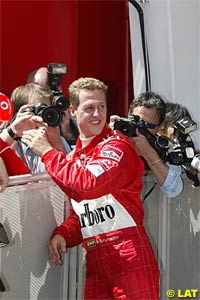
Atlas F1 Magazine Writer
Michael Schumacher is undoubtedly one of the greatest drivers in the history of Formula One - he has the speed, the talent and the determination to be the most successful man in 52 years of Grand Prix racing. Yet sometimes he has failed to cope with the pressure of being the sport's main star. On Sunday, it happened again. Richard Barnes explains
After committing an outrageously cynical and unsporting attempt to crash rival Jacques Villeneuve out of Championship contention at Jerez 1997, Schumacher's immediate reaction was to blame Villeneuve for 'spoiling my race'. It took several days, and the concerted efforts of team, agent and close confidantes to persuade Schumacher that, however convincing the explanation may have sounded to him, nobody else was buying it.
On Sunday, Schumacher's transparency under pressure showed again. After taking the chequered flag, he waved to the fans during the victory lap, as if nothing out of the ordinary had happened. Once the Ferrari V10 had cut out in parc ferme, alerting him to the sound of massed booing of the spectators, a very different Schumacher emerged from the cockpit. During the press conference, Schumacher placed the blame squarely on the Ferrari hierarchy, stating that he was purely following orders given by the team. It would be easy to conclude that he was lying, to deflect the blame and public anger away from himself. Yet there is a precedent to suggest that, in this instance, his answers were honest.
During his absence from racing following the Silverstone accident in 1999, Schumacher made it abundantly clear that he loathed the prospect of Eddie Irvine breaking Ferrari's Championship drought. The German declined to even attend races, where his presence alone would have boosted the morale of the entire team. He downplayed Irvine's Championship chances, vocally promoting McLaren rival Mika Hakkinen as the better driver and more deserving champion. Even after his leg had healed sufficiently for him to race again, Schumacher begged off returning. Yet when Ferrari racing boss Luca di Montezemolo demanded his return, Schumacher acquiesced meekly, turning in perhaps the most startling race of his career to help Irvine win at Sepang.
There are two aspects about Malaysia 1999 that have direct relevance to Sunday's events. The first is that Schumacher put aside his selfish concerns to help the team. That single act scotched the popular public perception that Ferrari is employed by Michael Schumacher, and not vice versa. For a sport in which teams are becoming increasingly international, Ferrari remains a defiantly Italian entity. Schumacher is acutely aware of his outsider status, and panders to the team's ethic wherever possible. When an Italian criticises the German for conducting the Italian national anthem on the podium, Schumacher listens and desists. The Ferrari tail does not wag the dog, whatever the fans may think.
The second relevant factor of Malaysia 1999 was Schumacher's performance during the race. It would have been all too easy for him to deliberately underperform, offer no help to Irvine, and declare afterwards 'See, I was right, I'm not ready to return yet.' But that is not how Michael Schumacher operates. When he gets strapped into a car, his instincts and ego take over. Schumacher was never going to simply help Irvine to win the race. It was an opportunity to demonstrate his superiority and he took full advantage, crushing both potential Championship-winners in the process. Schumacher lives to win, it's hard-coded into his DNA. If he's not allowed to win, he'll show that he deserved to win. And if he doesn't deserve to win, he'll take the ten points anyway. Strap him into a F1 car, and he'll take whatever's on offer.
Combine these two factors, his slavish devotion to the team and his 'I'll take whatever you let me' ethic, and it becomes easier to understand his actions and motives on Sunday. Unfortunately, he wanted to have his cake and eat it, to remain the darling of both his employer and the fans. Ultimately, he may end up losing the support and empathy of both.
Michael Schumacher has made Ferrari his lifetime home, and is looking beyond his retirement, whether that happens in 2004 or not. As a corporate player, he will be expected to fit in with the corporate ethic. The entire Ferrari hierarchy, from Luca di Montezemolo through team boss Jean Todt to technical director Ross Brawn, have presented a unified front to the media - 'No apologies, no excuses, we did the right thing and we'll do it again in a heartbeat. It's a pity for Rubens, but we aren't in this business to be nice guys, we're here to win.' If Schumacher had directly defied the team order on Sunday, he'd have been the only voice with any influence to go against the establishment. That doesn't suit his longer-term ambitions with the Scuderia.
His eventual compromise, obeying the team order then criticising it publicly, will be viewed by Ferrari for what it was - Schumacher's attempt to be all things to everyone. As such, it may be dismissed as trivial. But, if the same scenario repeats later in the season with the same public differences of opinion between team and driver, something is bound to give. We are led to believe that the Schumacher/Ferrari relationship is so cosy that nothing could possibly threaten it. After all, they gain so much from each other that it would be daft for both parties to ever terminate the relationship. One could apply the same logic to Simon and Garfunkel, or the Beatles...
Ultimately, Schumacher may be forced to side with the fans who demand genuine and fair racing, or with the business ethic of 'we're here to win, period.' Which path will he choose? For most, it's a rhetorical question. Schumacher will look out for number one, as he always has. Even if he openly defied Ferrari and sacrificed his longer-term relationship with the Scuderia, it's unlikely that he could ever regain the full respect of the fans. If Adelaide '94 was strike one and Jerez '97 strike two, Austria 2002 was the emphatic and conclusive strike three. Schumacher is a brilliant driver and racer, one of the finest ever. Sunday's race didn't change that. It only removed the icing from the cake, and denied him the possibility of ever being regarded universally as a great champion.
It is disturbing that the rich heritage of Ferrari, and possibly the FIA too, have been placed in the spotlight. Nevertheless, it is essential. Formula One, indeed most professional sports, have been on the slippery downslope for some decades now. It is blind to continue fooling ourselves that this is still a sport ruled by fair play. It is a business, and has been for a while. It is also pointless for professional sports fans to try and pass the buck onto the competitors and regulatory bodies. The fans, by worshipping the winners and deriding the losers, have been a major contributor to the process.
We are quite content to carry on seeing the code of sporting conduct groan and creak under the weight of fan expectations and star self-interest. Just as long as it bends but doesn't break, we can convince ourselves that things are still settled honourably. On Sunday, the sporting code didn't break. It ruptured, spectacularly and in full view of the public. We were always willing to tolerate covert team orders, as long as it 'tightened up the Championship' or wasn't done too blatantly. We could always rationalise that a botched pitstop or 'brake problems' were just what the team said they were, and nothing more.
The Ferrari management's brazen honesty and unrepentant stance have ended that era. We can no longer pretend that team orders are the deluded ramblings of conspiracy theorists, or that they will only be applied in the most extreme circumstances. Ferrari have laid down the new standard. This is a business, and will be run like one. It is up to the FIA, the other teams and the fans to either put up or shut up. As uncomfortable as it may be, it's time to stop pretending and face the realities of F1 as a 21st century sport. It's a watershed that poses many issues and questions. The FIA hearing on June 26th will answer some of those questions. Whether for better or worse, richer or poorer, Sunday 12th May 2002 changed the face of F1 forever.
Pride and ambition are terrible things. They turn honest men into liars, and make wise men behave like fools. The most shocking aspect of Sunday's controversial Austrian Grand Prix was not Ferrari's imposition of team orders. Instead, it was Michael Schumacher's willingness to stumble into the single greatest blunder of his driving career.
 Most of the time, Schumacher is able to project a public image of worldly, urbane professionalism. In times of stress, that image shatters and reveals a completely different character - single-minded, simple and often out of touch with the world around him. Schumacher's reputation for attention to mechanical and racing detail is legendary and well-deserved. He clearly spends more time perfecting his craft than any other driver on the grid, perhaps more than any other driver in the history of the sport. Each extra hour spent concentrating on his driving is an hour lost to study and observation of the world around him, and it shows.
Most of the time, Schumacher is able to project a public image of worldly, urbane professionalism. In times of stress, that image shatters and reveals a completely different character - single-minded, simple and often out of touch with the world around him. Schumacher's reputation for attention to mechanical and racing detail is legendary and well-deserved. He clearly spends more time perfecting his craft than any other driver on the grid, perhaps more than any other driver in the history of the sport. Each extra hour spent concentrating on his driving is an hour lost to study and observation of the world around him, and it shows.
Please Contact Us for permission to republish this or any other material from Atlas F1.
